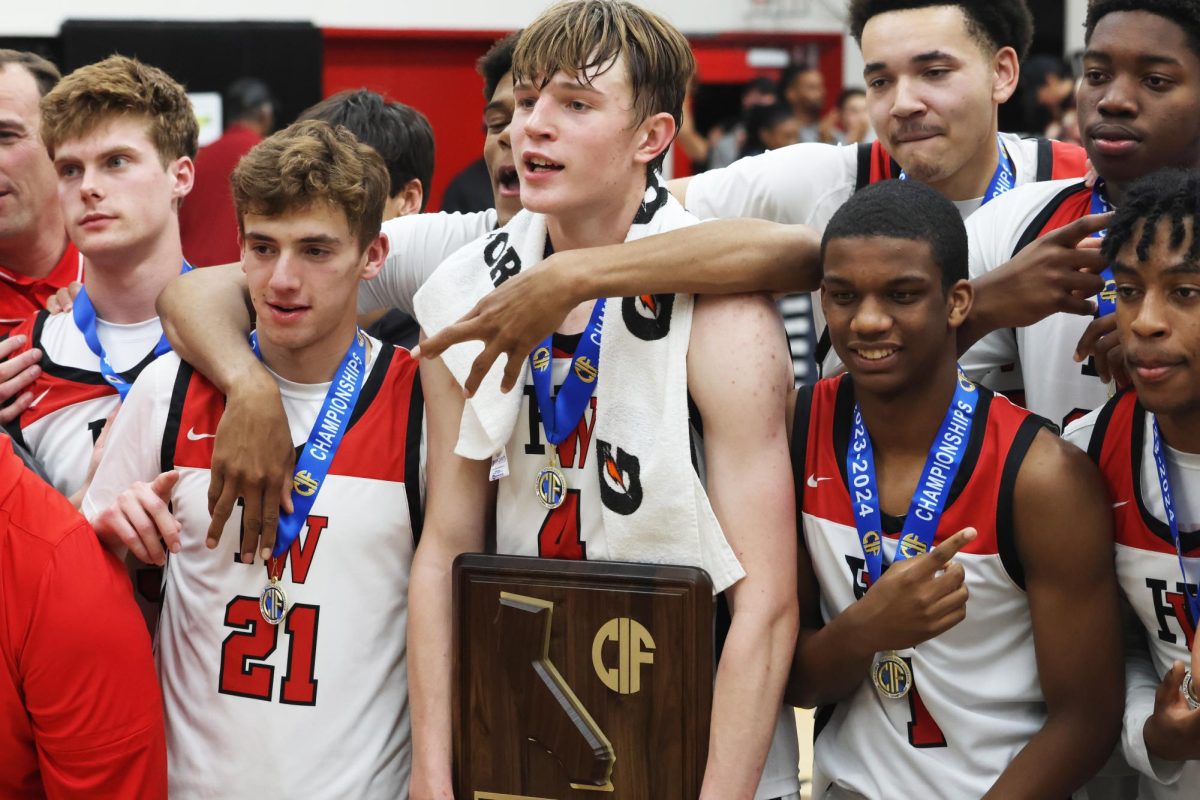By Austin Block, Alex Leichenger and Jean Park
Despite the conflicts that playing multiple varsity sports can create, most of the schoolâs coaches support students who play more than one varsity sport.
“I think athletes playing multiple varsity sports is wonderful. It is terrific for the school, and the experiences are tremendous for the athlete,” track and field coach Jonas Koolsbergen said. “The vast, vast majority of our kids will never play beyond college and they should take advantage of high school as an opportunity to do a wide variety of activities and enjoy themselves.”
The coaches generally agree that playing another sport helps, or at least doesnât hurt, the athleteâs performance in their sport.
“Each sport uses some muscles more than others. When an athlete gets in an unusual position, his other sport muscles may kick in. Using basic skills, a good athlete can adjust to the situation,” football coach Vic Eumont said.
“Athletes always benefit from becoming better overall athletes and being in difficult competitive situations,” Koolsbergen said.
“I am a huge supporter of multi-sport athletes. If students can manage their studies and play multiple sports then Iâm all for it. Bridget Ballard â06 was one of the top soccer players in school history, and she played four varsity sports, so it can certainly be done,” girlsâ soccer coach Richard Simms said.
Many of these athletes have to miss training classes, offseason training, or sometimes even practices and games.
“We stress making up what you miss. High school, as well as college, is the starting ground for their future choices. To harness those choices at an early age does not adhere to the mission of schools,” Eumont said.
“Our training in the off-season is for those not in other sports. Just like any other sport, if their other sport is in the playoffs, they will miss some of spring practice and that is a good thing. It means they are probably a good player. That also means a younger player will get more turns in practice,” Eumont said.
The coaches said they do not make any concessions for the players besides allowing them to miss practice or training for the other sport.
“They are treated equally just like the other members of the team. Once their commitment with their other sport is done, and they get their rest, they are treated the same,” Arroyo said.
Some of the coaches have to catch the players up after they finish their other sport.
“I think [playing multiple varsity sports] is great. Unfortunately, in todayâs society, itâs hard. In order to stay up with your competition you almost have to stick to one sport. The competition for a scholarship is so intense that people tend to give up everything else,” softball coach Joe Aranda said. “I do feel for the athletes. It has become so competitive that it can take away some of the fun.”
Head of Athletics Audrius Barzdukas and Athletic Director Terry Barnum both cited the rise of club sports as a cause for the declining number of athletes who play multiple varsity sports. In earlier years, there was not as much offseason activity as there is now for each sport, Barnum said.
“There wasnât the pressure to play year-round sports because there wasnât any,” Barnum said. “When basketball season was over, it was over. So there was nothing to go do over the spring or summer because there was no basketball. Everyone was off doing another sport.”
“[Playing multiple varsity sports] requires organization and commitment, but it absolutely is possible. But I think more and more families are unwilling to do what it takes to do that,” Barnum said. “Thereâs the false notion that there isnât enough time to do more than one thing and be good at it. I donât think that thatâs true.”
It takes the “courageous” students and families to go against the trend and make multiple commitments, Barnum said.
“But I think that if enough people say it, perception becomes reality, and it takes courageous students and families to say, you know, we are going to go against the grain a little bit and we think there is enough time to be a good student and a good athlete in more than one sport.”
As for the notion that coaches would bench an athlete because they missed training time due to a commitment in another sport, Barzdukas believes it is unlikely.
“Coaches are relentlessly pragmatic. And if you are good enough, theyâre going to put you in the lineup and play you,” Barzdukas said. “If you can play, theyâre going to find a spot for you.”



































